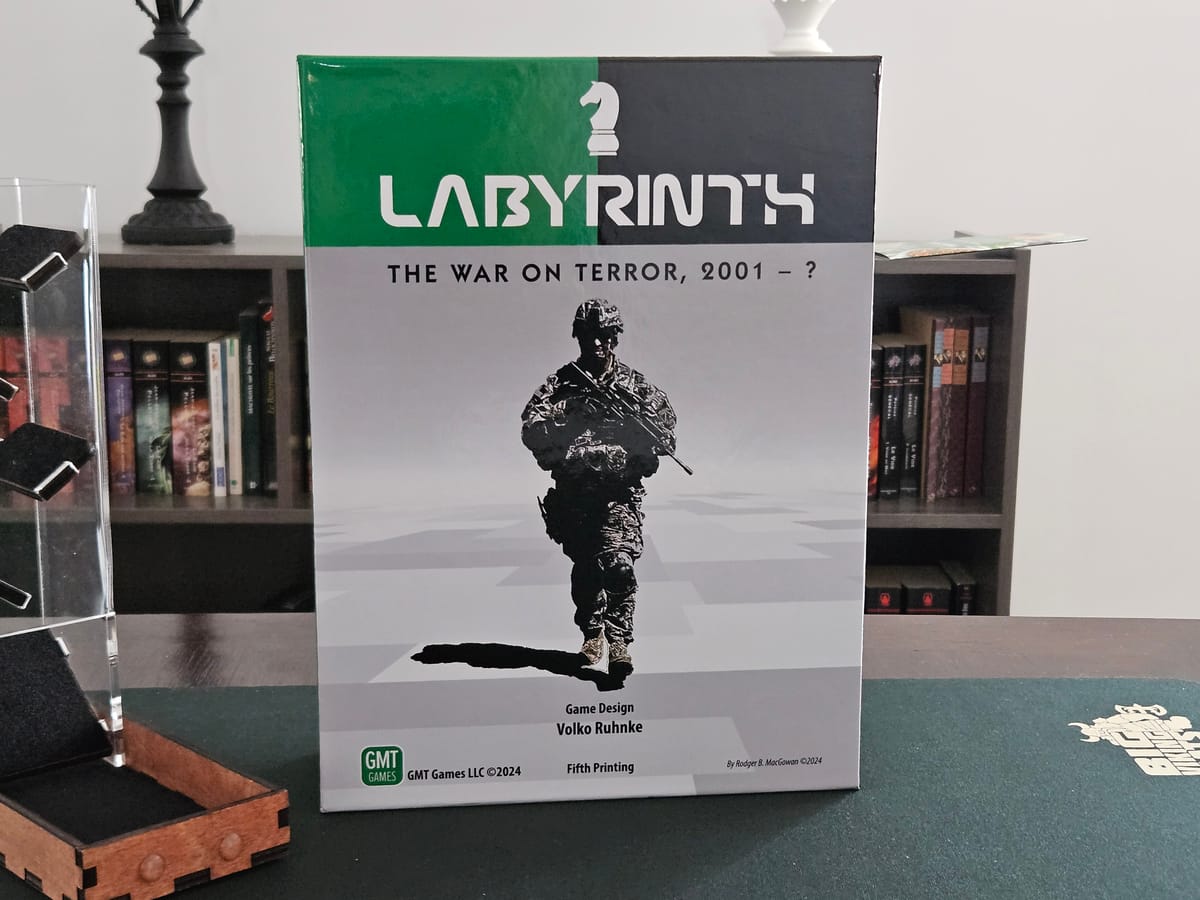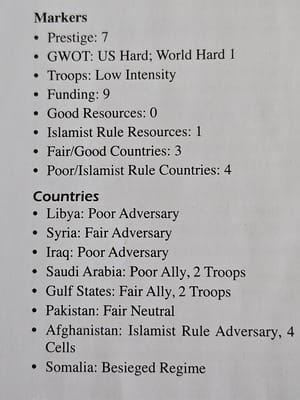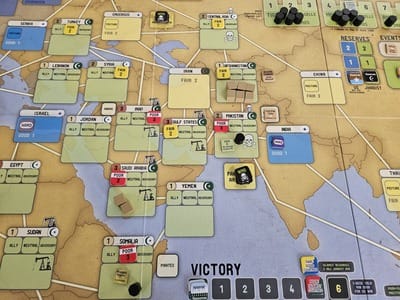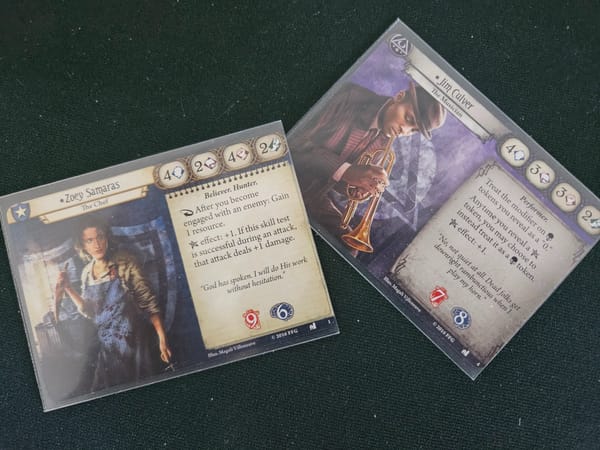Labyrinth: AAR #1.1
After action report (AAR) of my Labyrinth game, part 1. Luck is on our side!

I want to try something different with this post, see if I like to write in this format and if you, my dear reader friends, like it. When I wrote but my limited pool experiment in Arkham, I was very brief about my game, my focus on the deck evolution. This is a more detailed report, in the genre, we often use the term After-Action Report (AAR) to describe it.
I'm playing here a game called Labyrinth: The War on Terror, 2001-. You can find another post summarizing the game that you can read here. I'm a beginner, this is only my second game. I'm pretty sure I messed up many rules in my first game, we'll see how it goes now. Technically, I restarted this game after two turns, something clicked in my head, I understood a key strategy; you have to work on getting rid of Islamist states as quickly as possible.
I'm playing the base scenario. It starts in 2001, Afghanistan is an Islamist state with four cells. Three countries start at the adversary level (Iraq, Libya and Syria) while another one is neutral (Pakistan). The US has two troops in two allied states, Saudi Arabia and the Gulf States. Three countries start at the adversary level (Iraq, Libya and Syria) while another one is neutral (Pakistan). This is a standard one-deck game and I'm using the AI bot from the expansion as recommended by the community.

Turn 1
Feels like a lucky draw, my hand is formed mostly of US events, but first, let's see how the bot makes my life miserable. They recruited 3 cells in Afghanistan, reinforcing their Islamist state, plus one in the Philippines via an event; the Philippines is now on a hard stance, good for me. I have the Abbas event, it's straight up +1 prestige for me and -2 funding for the Jihadists. I followed with a tactical retreat of redeploying my troops from the Gulf States to the reserve track. This is in prevision of redeploying in Afghanistan without going too far down in my troop tracks so that I could keep drawing a maximum of cards.
Back to the bot, it had another favorable event, placing one a cell in Afghanistan and one in Central Asia (initial roll= Fair). It immediately tried to worsen the governance there, but failed its roll, putting the cell back into the reserve. To fight the Islamist state, I need a 3 influence event, which I didn't have. Therefore, I used one of my cards to store 1 influence in my reserve pool, followed by a second card to change the regime in Afghanistan, it then automatically becomes an ally, with an initial governance of Poor.
The bot continues to pile on in Afghanistan, it will make the improving its governance difficult, adding another cell. It then played an event moving one cell from there to Italy (initial roll = Hard), which felt like a lucky draw for me. I played a powerful event, Hijab, requiring no Islamist state in play. This put Turkey's governance to Fair (neutral state), made sure France had a Hard stance while also removing another 2 funding from the bot. It's one of my learnings from this game: if I can limit the funding from the Jihadists, it will severely limit their ability to deploy cells. Back in Afghanistan, a disrupt action removed one cell and turned one on its active side. My idea here was to make sure they could not attempt to reverse my regime change by removing their cells.
It was like the bot read my mind. It used an event to bring back its Italian and Filipino cell back to Afghanistan. Its second action failed to worse the governance in Turkey. As I previously mentioned, I had a strong hand to resolve the Afghanistan quagmire: one more event to remove 2 cells and a disrupt roll removed another 2. The turn concluded by the bot placing a plot in Afghanistan and I removed.
Thanks to the many disrupt actions and the end of turn bonus, the world track is maxed out at 3 hard, my prestige is already very high. Meanwhile, the Jihadist funding is already down to 5.
Turn 2
Another turn, another hand full of US events! This turn started with the bot placing a total of three plots. I was able to counter two of them with my action, but I couldn't do anything against the last one. It boosted their funding by 1 and reduced my prestige by 1.
Continuing with this trend, the bot placed another plot in Afghanistan; that's another reason why I wanted to reduce the number of cells, and added a cell in Somalia (initial roll = Poor) with an event. I chose to let this plot run its course and focused on attacking on a different front. An event upgraded the Pakistan stance to Ally while making sure India was on a Hard stance. I played a second event, removing 2 cells in a Regime Change state, which had the downside of reducing my prestige by 3. The plot further reduced my prestige, now at 5, while giving some funding back to the Jihadists.

Turn 3
My luck of the draw continues here, and I'm starting to feel this game won't represent a typical game. The bot continued to place plots, two to be exact, in Somalia, and added a cell in Pakistan. I used the US election card to remove one of the plots and, luckily, the event didn't mess up with my stance or prestige. The second plot brought some funding back to the Jihadists.
This turn can be summarized by a bunch of failed recruiting rolls by the bot and failed improved governance rolls on my side. Other items worth of note: Benelux, Spain and Germany are now with a Hard Stance thanks to different events and cell movements. Libya is also now an ally via an event. Overall, it's still looking fantastic for me, my prestige is at 10 and the bot funding is down to tight, which minimizes their card draw and recruitment.
This report is getting long, I will stop here for the moment. I will have the rest of the game in a different post later this week. Do you like this format? Are you interested in AAR? What would you want to see in them? Please leave a comment below.



